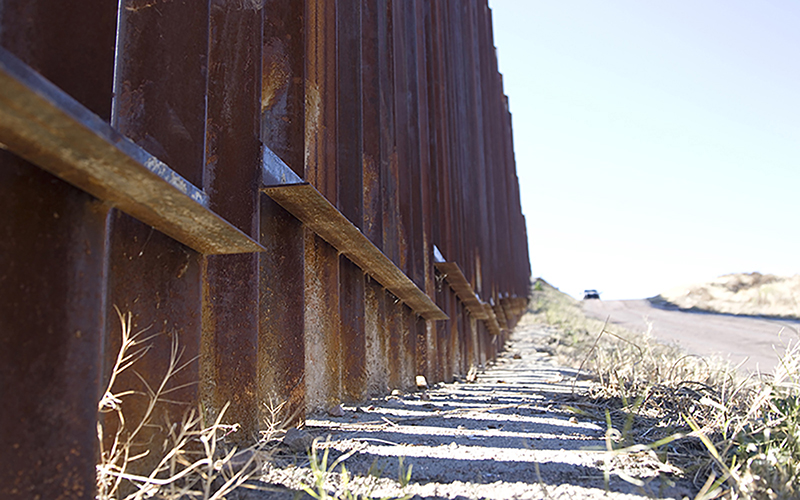
As a group of border residents urged lawmakers to defer any action on border enforcement bills until the next Congress is seated in January, the White House said it is preparing to announce new limits on asylum seekers at the border. (Photo by Josh Orcutt/Cronkite News)
WASHINGTON – Advocates from Southwest border communities on Thursday called on Congress to resist the urge to ram through border laws in the coming lame-duck session before the newly elected, more Democratic, Congress is sworn in next year.
But Tucson resident Vicki Gaubeca, director of the Southern Border Communities Coalition, said in a conference call that advocates are “expecting an ugly fight” over bills to fund the border wall, surveillance technologies and additional border agents.
She said the coalition expects President Donald Trump to view the lame-duck session, with Republicans still in control of the House and Senate, as a last chance to get full funding for his border wall.
“He will do so … in spite of the fact that the majority of voters do not want a wall, and border walls are ineffective and harmful – wasteful and deadly to border communities, our environment, and our wildlife,” she said.
The coalition’s plea came the same day that the Trump administration said it is preparing to make it easier for the government to turn away asylum seekers who show up at the border.
White House officials were vague on the details of the plan, which they said will be revealed in a proclamation issued Friday by the president. But the goal will be to set a “higher bar” for asylum seekers, rejecting those who turn themselves in anywhere other than an official port of entry and exercising the president’s authority to “suspend entry of any class of aliens deemed appropriate.”
The changes would follow weeks of heated campaign-season rhetoric by Trump in response to a caravan of thousands of Central American migrants that is slowly heading north through Mexico.
The president, who deployed thousands of National Guard troops this spring to help Border Patrol agents, said last week that he was also sending active-duty military to the border, specifically in response to the caravan.
The Pentagon confirmed Thursday that about 5,600 active-duty troops are now at the southern border and that the number is likely to grow “as the mission requirements become clearer.” Guardsmen and active-duty military are prohibited from enforcing border laws, but can act in a support role to Department of Homeland Security officials patrolling the border.
Advocates on Thursday’s call said measures like the proposed border wall and troop deployments are “monuments to vanity” that will not solve problems in the immigration system.
“With so many issues and no semblance of congressional oversight over the last two years, this is no time to increase funding in a wave of pressure,” said Ur Jaddou, director of DHS Watch. “Instead, Congress should be getting ready for … an effective oversight agenda on many of these reflective issues.”
Matthew Sussis, a spokesman for the Center for Immigration Studies, which favors reduced immigration, said that if the lame-duck Congress doesn’t act, it’s unlikely any border security measures will be passed. There are several measures pending, including a bill by House Majority Leader Kevin McCarthy to direct $20 billion toward a border wall, but Sussis is doubtful any will pass.
“It’s hard to imagine that kind of wall funding passing a Democratic house, especially since they couldn’t even get it passed with GOP control,” Sussis said.
He said that troops and walls are unlikely to deter immigration anyway, as long as migrants can exploit “loopholes in our asylum laws.”
“The issue here really has almost nothing to do with the troops,” Sussis said. “The border wall presents the same issue – you can build the biggest wall in the world, but it doesn’t mean much if any migrant can simply show up to a port of entry and claim that they want asylum, and be allowed in.”
If Congress – either the current one or the one on the way – will not pass Trump’s immigration policies, Sussis said, the president may resort to the use of executive orders or reliance on the attorney general to carry out his plans.
But the border community advocates said more-restrictive laws will not help. They called on Congress to create more options for migrants in the U.S., such as in-country programs for refugee resettlement and more robust systems at ports of entry to more efficiently process the migrants who do show up.
“Border communities are already responding to the needs of many people who come to our border,” Gaubeca said. “This is not an unusual thing for our border communities, and our border communities are far more benevolent than Congress or our president would like to portray right now.”
Follow us on Twitter.